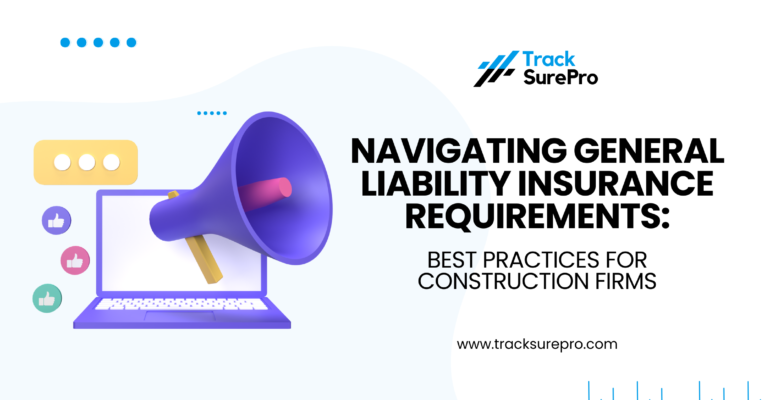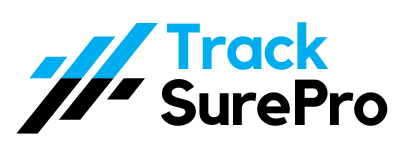Navigating General Liability Insurance Requirements: Best Practices for Construction Firms

Navigating General Liability Insurance Requirements: Best Practices for Construction Firms
Introduction:
General Liability Insurance is a cornerstone of risk management in the construction industry, safeguarding firms against claims resulting from injuries and property damage to third parties. As construction projects grow in complexity and scale, understanding and managing these insurance requirements become critical. This detailed analysis explores the intricacies of General Liability Insurance, outlines best practices for construction firms, and introduces the TrackSurePro software as a transformative solution for managing these challenges effectively.
Understanding General Liability Insurance:
- Scope and Coverage:
- General Liability Insurance covers legal fees, settlements, and medical payments if businesses are found legally responsible for harming a third party. For construction firms, this includes accidents on the construction site, damages caused by employees, and other liabilities arising from company operations.
- Importance of Adequate Coverage:
- Adequate insurance coverage is critical to protect against potentially devastating financial liabilities. Construction firms must assess their exposure to risks based on project size, contractual obligations, and operational hazards to determine appropriate coverage limits.
- Regulatory Compliance:
- Compliance with state and local regulations regarding liability insurance is mandatory. Firms must ensure their policies meet minimum requirements to avoid fines and legal penalties, which can vary significantly from one jurisdiction to another.
Best Practices for Managing General Liability Insurance:
- Regular Policy Reviews:
- Construction firms should conduct regular reviews of their insurance policies to ensure coverage remains aligned with their current risk profile and project demands. This includes assessing policy terms during contract negotiations and following significant business changes or growth.
- Tailored Insurance Solutions:
- Given the diverse nature of construction projects, one-size-fits-all insurance policies are often insufficient. Firms should work with insurance providers to tailor policies that specifically address their unique needs, such as additional coverage for specific risks like environmental liabilities or cyber threats.
- Risk Management Strategies:
- Proactive risk management strategies, such as safety training, quality control measures, and regular site inspections, are essential to minimize the occurrence of incidents that could lead to claims. Such measures not only reduce insurance costs but also enhance the firm’s reputation for safety and reliability.
Challenges in Managing General Liability Insurance:
- Complex Documentation:
- Managing the extensive documentation required for insurance processes—from policy applications to claims management—can be cumbersome and error-prone, especially for larger firms handling multiple projects.
- Cost Control:
- Balancing adequate coverage with cost-effective premiums is a continual challenge. Firms must navigate the fine line between being over-insured (and overpaying) and under-insured (and risking exposure).
Solutions with TrackSurePro:
- Automated Document Management:
- TrackSurePro offers robust document management capabilities that automate and organize the storage and retrieval of all insurance-related documents. This reduces administrative burdens and improves accuracy in compliance tracking.
- Real-Time Compliance Monitoring:
- TrackSurePro enables firms to monitor compliance in real-time, ensuring that insurance coverage meets all contractual and regulatory requirements. Alerts and notifications can be set up to warn firms of expiring policies or coverage gaps.
- Claims Management Efficiency:
- With TrackSurePro, firms can streamline the claims process, from initial reporting to final resolution. The platform facilitates faster, more organized claims handling, which can significantly reduce the time and cost associated with claims management.
Conclusion:
Navigating the complexities of General Liability Insurance requires a strategic approach tailored to the unique needs of each construction firm. By adopting best practices such as regular policy reviews, tailored insurance solutions, and proactive risk management, firms can enhance their compliance and reduce their exposure to risks. Moreover, leveraging advanced solutions like TrackSurePro can transform the efficiency of managing general liability insurance requirements. With its powerful tools for document management, compliance monitoring, and claims handling, TrackSurePro is an indispensable ally for construction firms aiming to streamline operations and ensure robust protection against liabilities, thus safeguarding their financial health and operational stability in a competitive industry.

